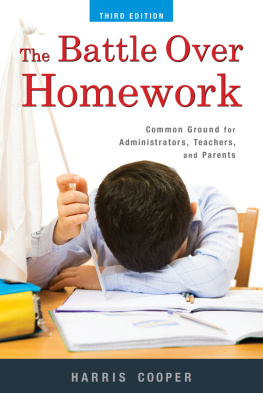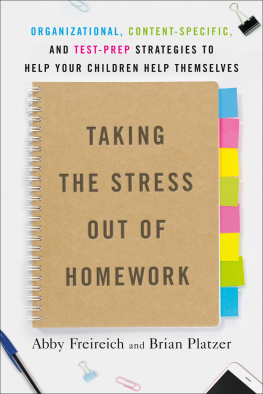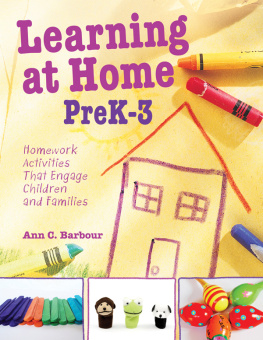To Faye Norflus Cooper, for the wonderful
things she passed on to her grandchildren,
through me.
Copyright 2007 by Corwin Press
First Carrel Books edition 2015
All Rights Reserved. No part of this book may be reproduced in any manner without the express written consent of the publisher, except in the case of brief excerpts in critical reviews or articles. All inquiries should be addressed to Carrel Books, 307 West 36th Street, 11th Floor, New York, NY 10018.
Carrel Books may be purchased in bulk at special discounts for sales promotion, corporate gifts, fund-raising, or educational purposes. Special editions can also be created to specifications. For details, contact the Special Sales Department, Carrel Books, 307 West 36th Street, 11th Floor, New York, NY 10018 or .
Carrel Books is a registered trademark of Skyhorse
Publishing, Inc., a Delaware corporation.
Visit our website at www.carrelbooks.com.
10 9 8 7 6 5 4 3 2 1
Library of Congress Cataloging-in-Publication Data is available on file
ISBN: 978-1-63144-007-6
Ebook ISBN: 978-1-63144-012-0
Printed in the United States of America
Contents
Preface to the Third Edition
H ow much time should children spend doing homework? Should elementary school children do any homework at all? Do both high and low achievers benefit from homework? What role should parents play in the homework process?
Homework is a source of complaint and friction between home and school more often than any other teaching activity. Parents protest that assignments are too long or too short, too hard or too easy, and too ambiguous. Teachers complain about a lack of training, a lack of time to prepare effective assignments, and a lack of support from parents and administrators. Students gripe about the time homework takes from their leisure activities, if they understand its value at all.
These complaints are not surprising, considering that homework assignments are influenced by more factors than any other instructional strategy. Teachers can structure and monitor homework in many different ways. Student differences play a major role because homework allows students considerable leeway in whether, when, and how to complete assignments. The home influences the process by creating an atmosphere that fosters or inhibits study. Finally, the broader community plays a role by providing other leisure activities that compete for the students time.
This third edition of The Battle Over Homework: Common Ground for Administrators, Teachers, and Parents has been significantly revised from the second edition. The summaries of research that appear throughout the book are based on a new synthesis of the most recent studies of homework. The policy guidelines have been completely updated. But the book is still meant to be a resource not just for school administrators but for teachers and parents as well.
I have written this book to help everyone involved in the process make sound decisions about homework. My objective is to provide readers with the terms, definitions, and research evidence needed to hold conversations about homework in a constructive manner. Also, I hope to help readers set effective homework policies, rules, or guidelines, be they for a school district, a school, a classroom, or a family.
The book speaks to all the parties in the homework processadministrators, teachers, parents, and students. A key to ending the battle over homework is communication. It is critically important for all parties to know what others are doing and why. To help communication, much of the material in the book is presented in the frequently asked questions, or FAQ, format that has grown very familiar in recent years. I did this to make it easy for readers to find answers to the questions that concern them most.
Administrators can use this book not only to help develop policies but also to assist in explaining to teachers and parents the rationale behind the homework guidelines they set. Likewise, teachers can use the book to improve their classroom practices and to assist in justifying those practices to parents and students. Parents will find reasons why certain practices are followed by schools and teachers as well as some practical advice regarding how to help their children with homework. But most important, I hope the book is used by administrators, teachers, and parents together to make their discussions about homework a positive experience and to help resolve disagreements.
The book addresses homework issues at both the elementary and secondary levels. We shall see that the differences in the functions and results of homework at different grade levels are among homeworks most interesting and revealing characteristics.
The book is divided into six chapters. The first chapter contains (a) a general definition of homework; (b) the important distinctions in homework assignments; (c) a list of the possible effects of homework, both positive and negative; and (d) a model of the homework process. Also, I provide a historical framework for understanding the issues and debates about homework. The second chapter summarizes research on whether homework is generally effective, as well as whether it is more effective for some grade levels, subjects, and types of students than for others. This chapter also looks at research on how much homework is best for students at different grades. The third chapter examines studies of variations in homework assignments that can influence their effects on achievement. Particular attention is paid to the structure of assignments and the value of classroom follow-up, such as grading and feedback. The fourth chapter looks at how the community and family fit into the homework process. It offers parents some suggestions, based on research, about when and how to get involved in their students assignments. The fifth chapter, written with school administrators and teachers first in mind, reviews some of the policy recommendations offered by government agencies, education-related organizations, school districts, and schools. I integrate some of these recommendations into a set of homework policy guidelinesconsistent with research findingsfor school districts, schools, and classrooms. Finally, I have included a chapter with tips for teachers, parents, and students meant to help them ensure that homework is completed in an efficient and effective way.
My involvement with homework began in 1986. In that year, I received a grant from the National Science Foundation to gather, summarize, and integrate the research on the effects of homework. At that time, research had little influence on homework practices and policies. This was because the influences on homework are complexno simple, general statement about whether homework helps learning was possible. Furthermore, there was enough homework research so that studies could be found to promote whatever position was desired, while the contradictory evidence was ignored. Thus, advocates for or against homework often cited isolated studies either to support or refute its value.
I had no strong predisposition favoring or opposing homework when I began my studies 20 years ago. I did have a two-year-old son at the time (with a daughter to follow shortly thereafter), so homework was about to become an issue in my family. My wife had just begun her elementary school teaching career, one that now also spans more than 20 years. In addition, I had much experience with techniques for summarizing research literatures (Cooper, 1998; Cooper & Hedges, 1994). I believe firmly that research, when comprehensively summarized and fairly treated, can positively influence educational policy and practice. Therefore, I attempted to collect all research, both positive and negative, that examined the effects of homework or that compared variations in homework assignments. Then, I applied the most rigorous techniques to integrate the results of studies, using statistical procedures if possible.












